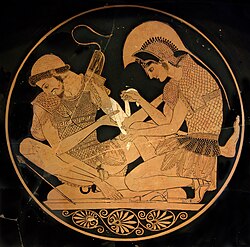
Back Aquiles y Patroclo Spanish Achille et Patrocle French Achille e Patroclo Italian 아킬레우스와 파트로클로스 Korean Związek Achillesa i Patroklosa Polish Aquiles e Pátroclo Portuguese Ahilej i Patroklo Serbo-Croatian Ахілл та Патрокл Ukrainian 阿奇里斯與帕特羅克洛斯 Chinese

The relationship between Achilles and Patroclus is a key element of the stories associated with the Trojan War. In the Iliad, Homer describes a deep and meaningful relationship between Achilles and Patroclus, where Achilles is tender toward Patroclus, but callous and arrogant toward others. Its exact nature—whether homosexual, a non-sexual deep friendship, or something else entirely—has been a subject of dispute in both the Classical period and modern times. Homer never explicitly casts the two as lovers,[1][2] but they were depicted as lovers in the archaic and classical periods of Greek literature, particularly in the works of Aeschylus, Aeschines and Plato.[3][4] Some contemporary critics, especially in the field of queer studies, have asserted that their relationship was homosexual or latently homosexual, while some historians and classicists have disputed this, stating that there is no evidence for such an assertion within the Iliad and criticize it as unfalsifiable.[1]
- ^ a b Lane Fox, Robin (2011). The Tribal Imagination: Civilization and the Savage Mind. Harvard University Press. p. 223. ISBN 9780674060944.
There is certainly no evidence in the text of the Iliad that Achilles and Patroclus were lovers. [...] Those contemporary critics who see all literary instances of male affection for males as proof of "repressed homosexuality" have the same problem as other conspiracy theorists: their hypothesis is invulnerable to disproof; we have no way of knowing if they are wrong.
- ^ Martin, Thomas R (2012). Alexander the Great : the story of an ancient life. Cambridge University Press. pp. 99–100. ISBN 978-0521148443.
The ancient sources do not report, however, what modern scholars have asserted: that Alexander and his very close friend Hephaestion were lovers. Achilles and his equally close friend Patroclus provided the legendary model for this friendship, but Homer in the Iliad never suggested that they had sex with each other. (That came from later authors.)
- ^ Fantuzzi, M. (2012). Achilles in Love: Intertextual Studies. OUP Oxford. p. 227. ISBN 978-0-19-162611-1.
- ^ Aeschines. "Against Timarchus", Section 133